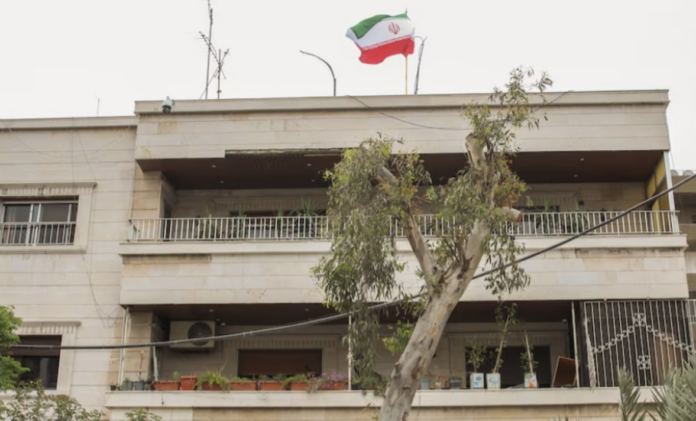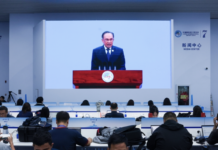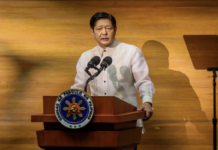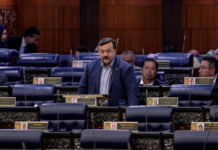NEW YORK, April 14 – Iran’s mission to the United Nations said early Sunday that Tehran’s retaliation for an attack on its diplomatic compound in Syria has ended, warning Israel against “another mistake” after Iran’s first military strike on Israeli territory.
The statement came after the Islamic Revolutionary Guards Corps (IRGC) launched a suite of explosive drones and fired missiles at Israel late Saturday, further raising tensions between the two countries over Israel’s alleged killing of senior IRGC commanders in Damascus earlier this month.
“Should the Israeli regime make another mistake, Iran’s response will be considerably more severe. It is a conflict between Iran and the rogue Israeli regime, from which the U.S. MUST STAY AWAY!” the Iranian mission said on social media platform X.
Sirens wailed, and loud sounds of suspected aerial interceptions of explosive drones reverberated across Israel. The Israel Defense Forces said it had intercepted nearly all of what it counted were 300 missiles and drones headed toward the country. Media reports said the U.S. and British militaries in the region had also shot down dozens of drones.
The Iranian salvo inflicted minor damage on one military base in Israel, and a 7-year-old girl sustained critical injury, a military spokesperson said. The Israel Defense Forces (IDF) had previously placed its troops on full alert and sent dozens of combat planes airborne in anticipation of the attack.
Still in the early hours of Sunday, a senior Israeli official vowed to respond in an “unprecedented” way and urged Israelis to remain awake for what might be coming afterward, according to local media Channel 12. Later, Israeli Defense Minister Yoav Gallant said the first major wave of Iranian strikes was repelled, but the confrontation is not yet over.
“In recent years, and especially in recent weeks, Israel has been preparing for a direct attack by Iran. Our defensive systems are deployed; we are ready for any scenario, both defensively and offensively,” Prime Minister Benjamin Netanyahu said in a statement.
In his first public statement after a two-hour situation assessment with members of his war cabinet, Netanyahu did not expound on whether Israel will retaliate, although Gallant on Thursday pledged an “appropriate response” against such a strike, which Tehran had vowed to launch.
In Washington, U.S. President Joe Biden, an ardent supporter of Israel’s ongoing war in Gaza, cut short his weekend vacation and met with his national security team, after which he pledged a coordinated G7 response and reaffirmed the U.S.’ commitment to Israel’s security as “ironclad” on X.
During a phone call, he told Netanyahu that Washington will oppose any Israeli counterattack against Iran, a senior White House official told Axios. “You got a win. Take the win,” Biden said, referring to the absence of anything of “value” being hit.
The IRGC strike was an inevitable response as the United Nations Security Council failed to condemn Israel’s alleged attack on Iran’s consulate in Damascus, Wei Liang, an associate research fellow of the Institute of West-Asian and African Studies of the Chinese Academy of Social Sciences, told CGTN.
In the X statement, Iran’s mission to the UN has invoked Article 51 of the UN Charter for the exercise of its “legitimate right” to self-defense, which occurred after “a 13-day period marked by the Security Council’s inaction and silence.”
But Iran’s warning about an Israeli response indicated its unwillingness to see the expansion of hostilities into a major Middle Eastern conflict or a full-blown war between the two countries – a de-escalatory tone that’s directed toward both Israel and the U.S., Wei said.
War between Israel and Iran would “incur tremendous security, social and economic damage to the Islamic Republic,” he said.
Iran’s first direct strike on Israeli territory has raised tensions to a new high following months of mutual attacks between Israel and Iran-aligned groups, including Lebanon’s Hezbollah and militia groups in Iraq and Syria. It also threatened to draw the U.S., whose assets in the region were also under attack by the groups, into further military involvement.
“The fact that such an attack was successfully blocked, also via close cooperation between Israel, Western allies and regional partners – sends an important message for future hostilities,” Nimrod Goren, a senior fellow for Israeli affairs at the Middle East Institute, a think tank based in Washington, told CGTN.
















